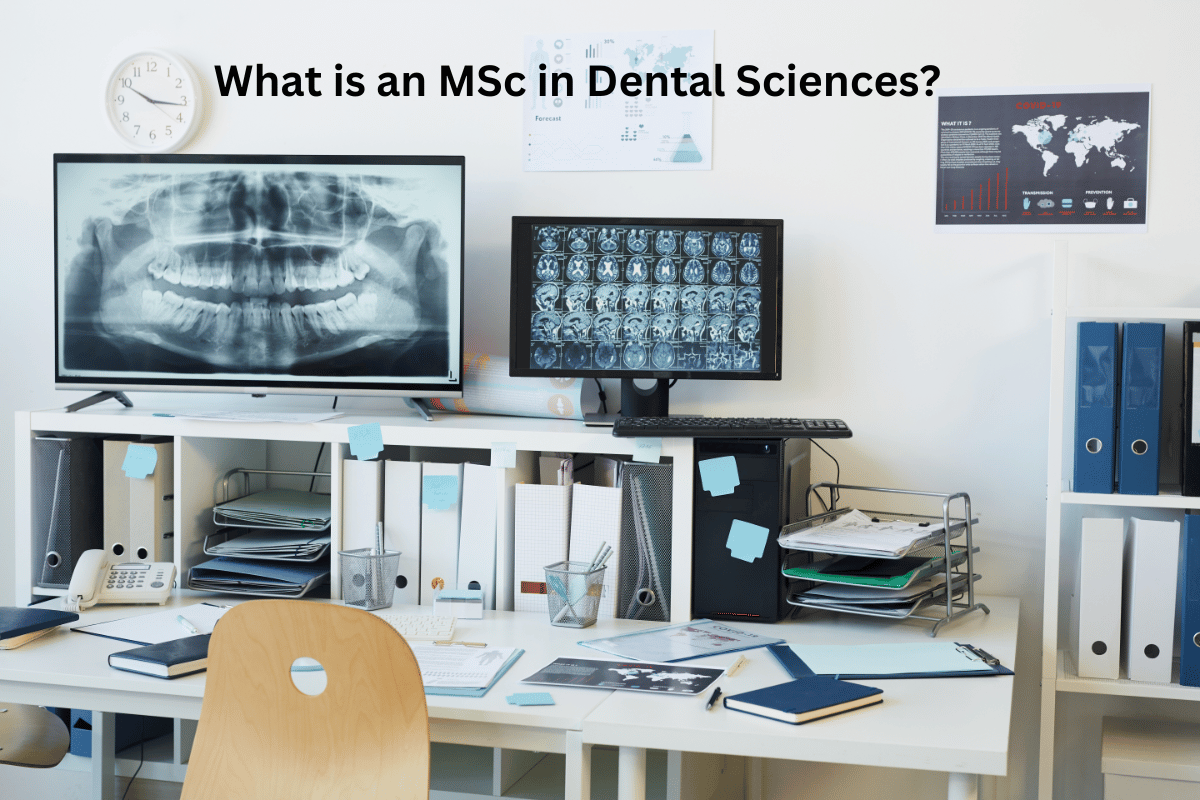What is an MSc in Dental Sciences?
Did you know that the dental industry is set to grow by 20% in the next ten years? This growth means there will be a higher demand for healthcare experts who focus on our mouths. To meet this demand, advanced knowledge and training are a must. A Master of Science (MSc) in Dental Sciences is a great way to get this. It’s a postgraduate program that really dives into the world of dentistry.
If you’ve already graduated from dental school or you’re just really passionate about mouth and teeth health, an MSc in Dental Sciences can be your next step. This program equips you with the skills and knowledge needed in this fast-growing sector. Now, let’s see what this program is all about and the doors it can open for you.
Key Takeaways:
- An MSc in Dental Sciences offers specialized knowledge and advanced training in various disciplines of dentistry.
- The program prepares students for research, teaching, and advanced clinical practice.
- Graduates have diverse career opportunities in research, teaching, management, and public health positions.
- Specialization options in the program include Endodontic, Oral Biology, Oral Pathology, and more.
- Admission requirements typically include a dental degree and additional prerequisites.
Dental Sciences Curriculum
First off, according to this dentist who does Invisalign in Alhambra, an MSc in Dental Sciences is a postgraduate program that focuses on advanced education and training in various aspects of dental science. This program typically covers topics such as oral biology, dental materials, clinical dentistry, and research methodologies. It is designed for dental professionals who wish to enhance their knowledge and skills, engage in dental research, or pursue academic careers.
The MSc in Dental Sciences has a focused curriculum. It aims to give students deep knowledge and skills in dentistry. They learn through classes, reading a lot of research, doing experiments, and analyzing data.
Students look closely at areas like biology and materials. The program pays special attention to keeping mouths healthy. They learn about teeth, mouth diseases, the materials dentists use, and how complex dental work is done. Understanding these topics well gives students a strong start in their dental science careers.
One key part is learning how to do research. Students do their studies and add new knowledge to the dental field. They read a lot, come up with ideas, run tests, and think about what their results mean. Over time, this makes them better at thinking critically and solving problems in dental science.
The whole MSc program takes about two years. It blends theories with hands-on learning. This mix ensures students are ready to meet the challenges of being a dentist.
After finishing, students have special skills and knowledge. They’re ready for careers in dentistry, research, teaching, or leading. The program makes sure they can contribute to making dental care better around the globe.
Dental Sciences Career Opportunities
Studying the MSc in Dental Sciences opens many doors in the dentistry world. This program gets you ready for different jobs. You could do research, teach, manage, or work in public health.
Research Positions
Many MSc grads aim for research jobs. They help improve dental care by investigating new methods and materials. This work is key to advancing our dental health.
Teaching
Other grads choose teaching. They pass on their wisdom to aspiring dentists. Teaching can be very fulfilling and also helps you grow.
Management Roles
Some go into management. They might lead dental clinics or organizations. In these roles, they use their skills for planning and making important choices to better healthcare.
Public Health Positions
Working in public health is an option too. Here, grad’s actions can benefit a whole community. They help set policies and run programs that keep people’s mouths healthy.
“A dentistry career can lead in many directions, thanks to the MSc in Dental Sciences. Whether it’s working in research, teaching, managing, or public health, you can shine with the right skills and knowledge.”
Dental Sciences Specialization
The MSc in Dental Sciences lets students choose from many areas of dentistry to specialize in. This focused learning provides them with the expert knowledge needed for their future careers. They get a certificate in their chosen area after finishing the program. This boosts their career options further.
Students can get deep into these areas:
- Endodontic
- Oral Biology
- Oral Pathology
- Oral Medicine
- Orthodontics
- Pediatric Dentistry
- Periodontics
- Prosthodontics
In each specialty, students get detailed education and hands-on training. This helps them become real experts. They learn skills for advanced clinical work, teaching, and research in their chosen field.
“Specializing in a particular area of dental sciences offers students the chance to delve deeper into a specific field and gain specialized knowledge and skills. This advanced training opens up new opportunities and strengthens their professional profile.” – Dr. Sarah Johnson, Director of Dental Sciences at XYZ University
The MSc program is a pathway for students to explore deep, advanced topics. They learn to do research. And they help push dental science forward. This makes them specialists with the power to really change the field.
| Benefits of Dental Sciences Specialization | Related Careers |
|---|---|
|
|
Choosing a specialty in dental sciences does more than just deepen your knowledge. It also leads to many career paths. With a postgraduate certificate, you can work as a specialist, researcher, or even teach future dentists.
By finishing the MSc program, graduates are ready to face the demands of their field. They have the skills and knowledge to do well in their careers.
Dental Sciences Requirements
To get into the MSc in Dental Sciences, you need to follow some rules. The university and CODA of the American Dental Association have set these. They’re looking for candidates who already have a dental degree. This shows they understand the basics of dental sciences.
If you got your degree from a dental school abroad, you must show more. This lets the university know you’re ready for the program. Here’s what you might need to show:
- English Language Proficiency: If English isn’t your first language, you’ll need to take a language test. The TOEFL or IELTS tests usually show if you’re good at English.
- Graduate Record Examination (GRE) Scores: Some schools might also want to see your GRE scores. They check how ready you are for the academic side of the program.
- Financial Statements: To study here, you need to prove you have enough money. This is for your school fees and daily costs while you study.
Before applying, make sure you know all the rules for your chosen school. Following these rules is key to getting into the Dental Sciences program.
“The Dental Sciences program offers a unique opportunity for individuals who have already completed their dental degree to further specialize and expand their knowledge in specific areas of dentistry. By upholding strict admission requirements, the program ensures that students are well-prepared to excel in their advanced studies.”
Admission Requirements for the MSc in Dental Sciences Program
| Requirement | Details |
|---|---|
| Dental School Graduate | Applicants must hold a dental degree from an accredited dental school recognized by the Commission on Dental Accreditation (CODA) of the American Dental Association. |
| English Language Proficiency | International applicants must demonstrate proficiency in the English language by submitting TOEFL or IELTS scores. The specific required scores may vary depending on the university. |
| Graduate Record Examination (GRE) Scores | Some universities may require international applicants to submit their GRE scores. The required minimum scores may vary. |
| Financial Statements | International applicants must provide financial statements to demonstrate their ability to fund their education and living expenses during the program. |
Dental Sciences Online Program
Are you looking to get a Master of Science (MSc) in Dental Sciences but need learning that fits your life? Online programs are perfect for you. They let you study dental sciences at your own pace and from a distance. This is great for those working who can’t make it to campus every day.
Even though you’re learning online, the programs are as good as being there in person. You still learn everything about dental sciences, like the latest dental skills, taking care of oral health, and how to do research.
You can study when it works for you because all your course materials are online. You don’t have to be in a certain place at a certain time. This makes it easier to mix your studies with your job or family.
Online, you use tools like virtual classrooms and discussion boards to talk with teachers and classmates. These tools help you learn together, chat in groups, and get advice from teachers.
You also get to meet people from all over the world who are studying the same thing. This wide network means you can work on projects together and learn from each other.
“The flexibility and convenience of online dental sciences programs make them an excellent choice for individuals seeking to further their education in the field while maintaining their personal and professional commitments.”
Some programs might need you to come to campus for hands-on training. This way, you make sure you know your stuff and are ready for anything in the field.
By going online for the MSc in Dental Sciences, universities are helping more people get a good education. This way of learning is new and flexible, perfect for anyone wanting to make a mark in dentistry.
Advantages of Dental Sciences Online Programs:
- Flexible learning schedule that accommodates personal and professional commitments
- Comprehensive curriculum with the same academic rigor as on-campus programs
- Access to online learning tools and platforms for effective communication and knowledge transfer
- Opportunity to connect with a diverse network of students and professionals from around the world
Dental Sciences Accredited Program
When choosing an MSc in Dental Sciences, pick an accredited program. Accreditation means it meets high standards. It gives you a quality education.
Going with an accredited program ensures a current and in-depth study plan. It also boosts your standing in the dentistry field.
“Accreditation ensures that the program meets industry standards and provides students with a quality education.”
An accredited program follows strict guidelines. You’ll learn the latest and most important dental skills.
This helps students and makes the program respected by professionals and employers.
After graduating from such a program, many doors open for you. These include research, teaching, and jobs in public health.
| Benefits of an Accredited Dental Sciences Program |
|---|
| High-quality education aligned with industry standards |
| Enhanced professional recognition and credibility |
| Improved career prospects and job opportunities |
When looking into MSc in Dental Sciences, check the accreditation. Make sure it’s from recognized bodies in dentistry.
By selecting an accredited program, you know you’re getting top-tier education. It prepares you for success in dental sciences.
Graduate Studies Application Process
Applying for graduate studies in Dental Sciences is simple with several important steps. These include meeting the admission rules, deadlines, and financial support. Doing this helps you as you move towards earning an advanced Dental Sciences degree.
1. Application Form
Start by filling in the online application form. This is given by the university with the MSc in Dental Sciences program. Make sure to give correct information about you. This includes contact details and your educational history.
2. Transcripts
Graduate programs need your academic transcripts. These should be sent to the admissions office by your school. Your grades should show you are ready for the program you’re applying to.
3. Letters of Recommendation
You’ll also need letters of recommendation. These should be from people who know how well you can study or work. It’s good if they can say why you would do well in the MSc in Dental Sciences program.
4. Personal Statement
In your personal statement, speak about why you want to study Dental Sciences. Include your goals and what you’ve done that makes you a great fit for the program. Make sure to mention how this program will help your career.
5. Admission Requirements
Every MSc in Dental Sciences program has its own requirements. You’ll need a certain GPA, some specific classes, and sometimes test scores like the GRE are required. If you’re from another country, you might need to prove your English skills with TOEFL or IELTS scores.
6. Application Deadlines
Don’t forget to apply on time. Missing the deadline could mean you have to wait for the next year to apply. Be alert for any early deadlines and plan your application schedule carefully.
7. Financial Aid
Graduate school costs money. Check with the school to see what financial help they offer. Scholarships, grants, work opportunities, and loans are some common ways to get financial help. It’s good to start looking for options early.
Knowing the steps for applying to an MSc in Dental Sciences can help you sail through the process. Remember to submit all documents on time. Also, meet all admission rules and explore financial aid. This will lay a strong foundation for your academic success.
International Students Enrollment
If you’re considering an MSc in Dental Sciences, know this. You’ll get a chance to learn a lot and grow. But first, you need to grasp what’s needed and get your documents right.
For this MSc, you must check off some boxes set by the universities. They want to see how well you know English. You also need to ace some tests and show you can pay for it all.
English Language Proficiency
Showing you’re good at English is key. Universities look for good scores in TOEFL or IELTS. These tests cover speaking, reading, and writing. They make sure you’re ready to join discussions and learn.
Standardized Test Scores
Along with English, you might need to do well in the GRE. GRE tests your writing, reasoning, and math. Good scores here show that you’re ready for advanced studies.
Financial Statements
Don’t forget about the financial side. You’ll need to prove you can afford your studies. Bank statements or scholarship letters work. They want to be sure you can focus on learning without money worries.
Make sure to look at what your university needs. Following their rules closely makes your application easier. Being organized and thorough helps open the door to an MSc in Dental Sciences.
Cost and Financial Assistance
Thinking about an MSc in Dental Sciences includes looking at the costs. Tuition fees, living expenses, and other costs depend on your choice of university and program. It’s smart to plan and budget well for your graduate studies.
Many universities provide ways to ease the financial pressure. Scholarships, grants, and student loans are common options to support your education. This help is vital to allowing you to concentrate on your studies without the worry of money.
If you’re considering an MSc in Dental Sciences, contact your chosen university’s financial aid department. They offer advice on funding options. Also, look for scholarships and grants for dental sciences to enhance your financial situation.
“Financial aid can make a real difference in funding your MSc in Dental Sciences. Use scholarships, grants, and loans to not let money issues stop your academic dreams.”
By looking closely at the program’s costs and exploring aid opportunities, you make the path to your MSc in Dental Sciences smoother. It’s about both planning and using financial help.
Financial Assistance Options
Here are some ways to find financial aid:
- Scholarships are available from universities and outside groups for dental sciences students. They consider your academic performance and other criteria, offering financial aid.
- Grants help students in dental sciences degrees too. These are sometimes based on merit or need, providing extra financial help.
- Student loans let you borrow money for your educational costs. Make sure you understand loan conditions and how you’ll pay it back.
Make sure to look into all the financial aid options available. This way, you can find the best help for you and your situation.
Program Duration and Structure
The MSc in Dental Sciences lasts for two years. It’s a full-time program. Students will learn through classes, research, and hands-on practice. This mix prepares them well for their future careers in dentistry.
Students take part in lectures, lab work, and research projects. This lets them get a good mix of theory and practice. It helps them become well-rounded professionals in the field.
Students can also do their own research and write a thesis or paper. This is a chance for them to focus on a topic they’re interested in. It also means they’ll be adding to what we know in the field of dental sciences.
At some schools, students might also do clinical work or internships. These real-world experiences are key for their learning. They help students get ready for the job right after they graduate.
This program is tough but worth it. It gives students everything they need to do well in their careers. They’ll get a mix of school lessons, chances to do research, and practical skills. This way, they can really make a difference in dentistry after they finish.
Program Duration and Key Features:
- Duration: Two-year program
- Full-time study
- Combination of coursework, research, and practical training
- Classroom lectures, laboratory work, and independent research projects
- Thesis or research paper
- Possible clinical rotations or internships
- Opportunity for specialization in specific disciplines
Conclusion
The MSc in Dental Sciences offers a great chance to improve in dentistry. This program helps students learn more and improve their skills. It also offers them chances to do important research.
This education prepares them for many exciting jobs. They could work in research, teach, manage, or in public health. Having an MSc in Dental Sciences makes a big difference in their careers.
Getting an MSc lets students dive deeper into the world of advanced dentistry. They learn a lot about their favorite areas. This makes them experts in their chosen field.
The program also focuses on research. Students can help the dental field grow. They might work on new treatments, find better ways to care for teeth, or come up with fresh ideas. The MSc in Dental Sciences encourages them to be curious and innovative.
FAQ
Q: What is an MSc in Dental Sciences?
A: An MSc in Dental Sciences is a postgraduate program that teaches specialized knowledge and advanced training in dentistry. It helps students learn in-depth and research skills. They can study to work in research, teaching, or advanced patient care. Students can choose a specialty and earn a certificate in that area too.
Q: What does the Dental Sciences curriculum cover?
A: The curriculum covers a wide range of dental topics. This includes biological and material science related to dental health. Students learn about oral diseases and disorders. They also do lab work and thesis research.
Q: What career opportunities are available for graduates of the MSc in Dental Sciences program?
A: Graduates can work in research, teaching, or management for dental organizations. They have jobs in public health, focusing on improving oral health for the community.
Q: Can students specialize in a specific discipline within Dental Sciences?
A: Yes, students can pick from several specialized areas within Dental Sciences. These include Endodontics and Orthodontics, among others. By specializing, students can get advanced training and get a certificate in their preferred field.
Q: What are the admission requirements for the MSc in Dental Sciences program?
A: Applicants need a dental degree from an accredited school. Those from outside the U.S. may need additional qualifications. This could include showing English proficiency and exam scores like the GRE.
Q: Is there an online program available for the MSc in Dental Sciences?
A: Yes, some universities offer online options for the MSc in Dental Sciences. These programs let students learn through flexible distance education. They cover the same material as on-campus courses.
Q: How important is accreditation for the MSc in Dental Sciences program?
A: Accreditation is key to ensuring a high-quality education. It makes sure the program meets professional standards. Graduating from an accredited program is well recognized and respected.
Q: What is the application process for graduate studies in Dental Sciences?
A: The process includes sending in your application, transcripts, and recommendations. A personal statement is also required. Meeting deadlines and discussing financial aid is crucial.
Q: What are the eligibility requirements for international students to enroll in an MSc in Dental Sciences program?
A: International students need to meet the university’s standards. This may mean they have to show they speak English well and have the right exam scores. They also must prove they can pay for their studies.
Q: How much does it cost to pursue an MSc in Dental Sciences, and is financial assistance available?
A: The cost varies and includes tuition and living expenses. Many schools offer financial help like scholarships or student loans. It’s wise to check what aid is available at your school.
Q: How long does it take to complete the MSc in Dental Sciences, and what is the program structure?
A: It takes about two years to finish the program full-time. Students will take classes, do research, and work in a dental clinic. They’ll also write a thesis. The exact program may change based on where you study and your specialty.
Q: What are the benefits of earning an MSc in Dental Sciences?
A: Getting an MSc in Dental Sciences boosts your knowledge and skills. It creates opportunities in research, teaching, or managing dental organizations. You could also work in public health to improve oral care for many people.







